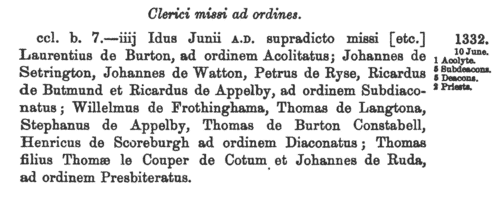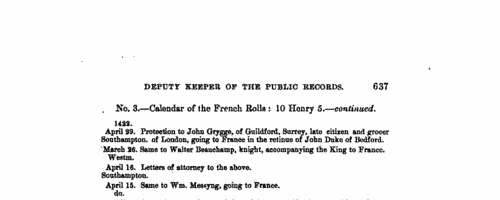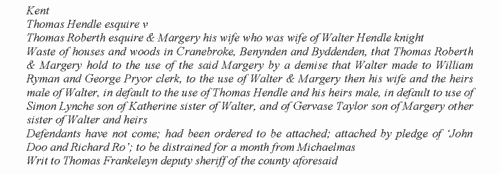Ledys Surname Ancestry ResultsOur indexes 1000-1999 include entries for the spelling 'ledys'. In the period you have requested, we have the following 11 records (displaying 1 to 10): Buy all | | | Get all 11 records to view, to save and print for £54.00 |
These sample scans are from the original record. You will get scans of the full pages or articles where the surname you searched for has been found. Your web browser may prevent the sample windows from opening; in this case please change your browser settings to allow pop-up windows from this site. Clergy at Beverley Minster
(1322-1347)
The minster (collegiate church) of St John of Beverley in Yorkshire was an important foundation with extensive ecclesiastical and temporal rights exercised by the chapter. The main register of the administration in both respects was the chapter act book, and this edition of the act book from 2 February 1322 to 19 November 1347 was edited by Arthur Francis Leach for the Surtees Society and published in 1903. The act book material occupies pages 1 to 136; to this were added extracts relating to Beverley from the registers of the Archbishops of York from 1279 to 1381; miscellaneous documents from York Minster manuscripts and the British Museum from 1135 to 1314; and a copy of the Beverley Provost's Book, compiled in 1417, but with material from the preceding centuries. All these sources are covered by this index: but the bulk of the personal references are from the chapter act book, and relate to clergy at or connected with Beverley.LEDYS. Cost: £4.00.  | Sample scan, click to enlarge

| Inhabitants of Yorkshire: Claro wapentake
(1379)
The poll tax returns for this wapentake, the area around Aldborough, Boroughbridge, Knaresborough and Wetherby.LEDYS. Cost: £6.00.  | Sample scan, click to enlarge

| Clergy, the religious and the faithful in Britain and Ireland
(1362-1404)
These are abstracts of the entries relating to Great Britain and Ireland from the Regesta of popes Urban V, Gregory XI, (Anti-Pope) Clement VII, Urban VI and Boniface IX, and the Lateran Regesta of Boniface IX. Many of these entries relate to clerical appointments and disputes, but there are also indults to devout laymen and women for portable altars, remission of sins, &c. This source is particularly valuable for Ireland, for which many of the key government records of this period are lost. Urban V was consecrated and crowned 6 November 1362 (the day from which his pontificate is dated); Gregory XI was crowned 5 January 1371; Clement VII 31 October 1378; Urban VI 18 April 1378; Boniface IX 9 November 1389 and died 1 October 1404. Until 1376 the papacy was in exile at Avignon. The extracts were made by W. H. Bliss from Regesta ccxlv to cccxx and Lateran Regesta i to xliii, and published in 1902. Bliss remarked that 'although the writing of the Papal Registers of the 14th century is clearer than that of many contemporary English MSS., the entries in them were for the most part founded upon petitions or letters from different countries, and the scribes in the Papal Chancery must have experienced even greater difficulty in copying English proper names than English students experience nowadays in reading the early Chancery Rolls preserved in the Public Record Office. Not having local or personal knowledge, they constantly misread doubtful letters.'LEDYS. Cost: £4.00.  | Sample scan, click to enlarge

| The English in France
(1415-1416)
King Henry V of England claimed the throne of France (and quartered the fleurs-de-lis of France with the lions of England on the royal standard) as had his predecessors since Edward III, as descendants of Philip IV of France. He married Katherine, youngest daughter of king Charles VI of France in 1420, and thereafter styled himself 'heir and regent of France'. The English had real power or influence in Brittany, Normandy, Flanders and Gascony, and actual possession of several coastal garrisons, in particular Calais, where the French inhabitants had been replaced by English. The English administration kept a series of records called the French Rolls. On these are recorded royal appointments and commissions in France; letters of protection and safe-conduct to soldiers, merchants, diplomats and pilgrims travelling to France from England and returning, and to foreign legations. There are also licences to merchants to export to the Continent, and to captains to transport pilgrims. This calendar of the French Roll for the 3rd year of the reign of Henry V (21 March 1415 to 20 March 1416) was prepared by Alexander Charles Ewald and published in 1883. The battle of Agincourt took place on 25 October 1415, so this roll has many letters of protection for soldiers, and various letters and orders relating to the ransoming of French prisoners.LEDYS. Cost: £6.00.  | Sample scan, click to enlarge

| Inhabitants of Sheffield in Yorkshire
(1440-1441)
The Duchess of Norfolk allowed T. Walter Hall to examine the early archives of her Sheffield estates, and in 1926 he published a volume including abstracts (in translation) of the Sheffield manor court roll from October 1440 to September 1441. In this roll was also the Sheriff's tourn 18 April 1441 of the superior jurisdiction of Hallamshire, covering the sokes of Sheffield, Hannesworth, Bradfield, Southawe and Ecclesfield; and this is also printed. Hall found fragments of a Bradfield court roll of 1385; and devoted the latter half of his book to extracts from the Register of Copyholders' Surrenders, showing surrenders and admittances of copyhold tenants of the manor of Sheffield from 1403 to 1634; plus some miscellaneous deeds and documents relating to the manor and to Hallamshire. The index covers all these.LEDYS. Cost: £4.00.  | Sample scan, click to enlarge

| Close Rolls
(1447-1454)
The close rolls of the 26th to 32nd years of the reign of king Henry VI record the main artery of government administration in England, the orders sent out day by day to individual officers, especially sheriffs of shires: they are an exceptionally rich source for so early a period. There is also some material relating to Wales, Scotland, Ireland and the English possessions in France. LEDYS. Cost: £4.00.  | Sample scan, click to enlarge

| Yorkshire Testators and Legatees
(1426-1466)
Wills and testaments from the diocese of York (Yorkshire, Nottinghamshire, Hexhamshire, Lancashire north of the Ribble, and southwest Westmorland) registered at York. Richmond and Southwell archdeaconries had their own lower probate jurisdictions, so the wills registered at York are predominantly from the East and West Ridings and the eastern part of the North Riding of Yorkshire. In theory, wills dealt with real property and testaments with personal property, but the distinction hardly applies in practice: most of these wills are in Latin, but some are in English. Being before the Reformation, they commonly start with benefactions to churches, chantries, chapels, &c., and with provisions for the burning of candles ('lights') and saying of masses.LEDYS. Cost: £4.00.  | Sample scan, click to enlarge

| Freemen of London
(1540-1550)
The long series of mediaeval registers and books of admission of the freemen of London was destroyed by fire in 1786. Thirty surviving charred leaves were gathered together and rebound, becoming Egerton MS 2408 in the British Museum. The order is jumbled and generally speaking none can be dated with certainty, although all belong to the very end of the reign of Henry VIII and the start of the reign of his son, Edward VI. These are pages from the admission books. Each entry here usually gives the name of the person admitted to the freedom; his father's name, address and occupation; his entitlement to the freedom, usually by having served out an apprenticeship to a citizen, naming the master and his trade. Then there may follow a cross-reference to M. or N., being two volumes of another set of official books denoted by the letters of the alphabet, and following each other in chronological sequence, which evidently gave details of entries into apprenticeships. These other books no longer exist: but the dates given for entry do identify the start of the apprenticeship, and so give by implication a date for the eventual admission to freedom. In the margin is the name of the city ward and the total of the fee and fine paid on admission.LEDYS. Cost: £4.00.  | Sample scan, click to enlarge

| Tradesmen of York
(1272-1558)
No man or woman could trade in the city of York without having obtained 'freedom' of the city.Their names were recorded on the 'Freemen's Roll', or Register of the Freemen of the City of York, which contains about 19,900 names for this period. A list of names was prepared for each year, the year being here reckoned as starting at Michaelmas (29 September) until 1373, and thence at Candlemas (2 February). Each annual list starts with the name of the mayor and the camerarii or chamberlains. The chamberlains were freemen charged with the duty of receiving the fees of the new freemen; of seeing that only freemen traded in the city; and of preparing this roll, which was compiled from the names on their own account books from the receipts for the fees. There are three groups of freemen: those who obtained freedom after serving out an apprenticeship to a freeman; the children of freemen; and those who claimed freedom by 'redemption', i. e. by purchase or gift from the Mayor and Court of Aldermen.
LEDYS. Cost: £2.00.  | Sample scan, click to enlarge

| Common Pleas: Sussex
(1558)
Pleas at Westminster Michaelmas term, 5 & 6 Philip & Mary and 1 Elizabeth, 1558. The court dealt with civil cases: debt, detinue, slander, assault, theft, breach of covenant, formedon, novel disseisin, &c. Each case is marked in the margin with the name of the county to the sheriff of which the writs were issued. Most often, but not necessarily, this would be the county of residence of the defendant. This calendar of the original formulaic record in abbreviated Latin on parchment has been made by David Bethell, preserving all individual detail from each case. The Latin text is translated: English phrases and passages are preserved literatim, in bold. CP 40/1176 mm.1-100LEDYS. Cost: £8.00.  | Sample scan, click to enlarge

|
| 1 | 2 |  |
Research your ancestry, family history, genealogy and one-name study by direct access to original records and archives indexed by surname.
|












